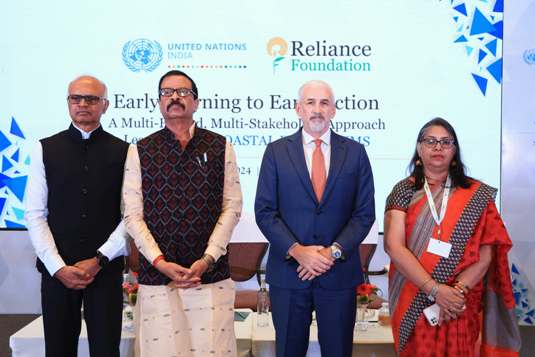Bhubaneswar, November 19, 2024 (TBB Bureau): Odisha continues to set benchmarks in disaster management with its pioneering early warning systems, said Suresh Pujari, Minister for Revenue and Disaster Management, at the inaugural session of a convening jointly organised by Reliance Foundation and the United Nations India.
 Speaking at the event titled “Early Warning to Early Action – A Multi-Hazard, Multi-Stakeholder Approach: Learning from Coastal Ecosystems”, Pujari said, “We are working collectively to further strengthen early warning systems, and we are happy that Odisha has been chosen as the first state to start this series of deliberations. We request our partners to integrate disaster prediction with information analysis for greater accuracy in early warnings.”
Speaking at the event titled “Early Warning to Early Action – A Multi-Hazard, Multi-Stakeholder Approach: Learning from Coastal Ecosystems”, Pujari said, “We are working collectively to further strengthen early warning systems, and we are happy that Odisha has been chosen as the first state to start this series of deliberations. We request our partners to integrate disaster prediction with information analysis for greater accuracy in early warnings.”
The convening, held in Bhubaneswar on Tuesday, marked the first in a series of dialogues aimed at strengthening early action strategies in disaster-prone regions. With Odisha’s disaster management practices serving as a model, the gathering showcased the state’s leadership in mitigating risks in vulnerable coastal ecosystems. Experts from the National Disaster Management Authority, India Meteorological Department, Indian National Centre for Ocean Information Services, UN agencies, academia, and NGOs participated in in-depth discussions.
Jagannatha Kumar, CEO of Reliance Foundation, emphasized India’s global leadership in early warning advancements, stating, “As climate change drives more extreme events, India is pioneering innovative solutions in early warning systems. This series aims to translate technological knowledge into actionable local solutions, ensuring that early warnings save lives and livelihoods.”
UN Resident Coordinator for India, Shombi Sharp, highlighted the international significance of Odisha’s efforts, adding, “Today’s convening is a vital step under the UN Secretary-General’s Early Warning for All initiative. The UN is committed to collaborating with the Government of Odisha, civil society, and partners like Reliance Foundation to build resilient communities.”
Panel discussions during the event addressed the effectiveness of current early warning systems and explored innovative methods to enhance future preparedness. Delegates underscored the importance of integrating socio-demographic data with meteorological forecasts to deliver targeted and impactful early warnings.
The convening also spotlighted youth-led disaster risk reduction initiatives and the role of livelihoods in disaster response strategies. Knowledge-sharing sessions featured insights from experts in Sri Lanka and Bangladesh, emphasizing the value of South-South collaboration.
Participants reflected on field visits to Balasore and Bhadrak districts, where Reliance Foundation and the UN India showcased community-level disaster preparedness efforts. A curated innovation walk further highlighted the technological advancements underpinning India’s early warning systems.
As the convening concluded, stakeholders committed to documenting best practices and driving policy-level outcomes. The collaboration aims to ensure that knowledge translates into local action, helping save lives and secure livelihoods in disaster-prone regions.
With Odisha leading the charge, this initiative promises to foster resilience across the Global South, addressing the growing challenges of climate-induced disasters.
 The Business Bytes
The Business Bytes